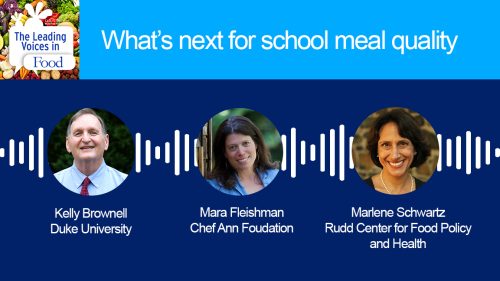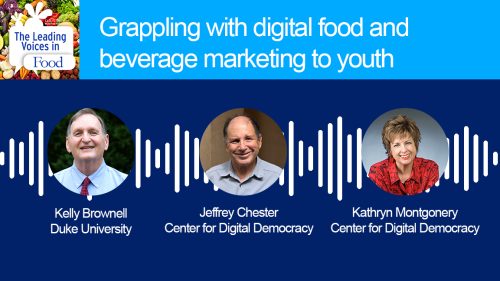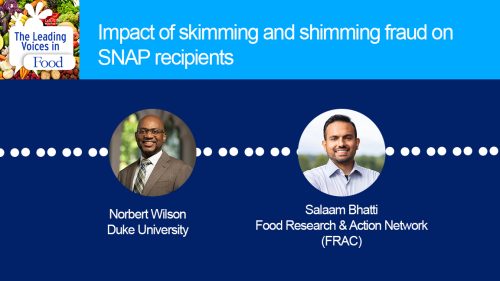The Leading Voices in Food
E114: Why Nutrition is So Important In the First 1000 Days of Life
At a conference on early child development and nutrition – comprised of leading experts on brain development, child development and public policy – one of the most memorable things said, in my mind, was that “poor nutrition early in life confers a life sentence.” Those striking words were issued by today’s guest, Dr. Michael Georgieff the Executive Vice Chair of Pediatrics and head of the Neonatology Division at the University of Minnesota.
Subscribe: Apple Podcasts | TuneIN | YouTube Music | SoundCloud | PocketCasts | Radio Public
Tags: Child Development & Nutrition | Childhood Obesity | Children Food Preferences | Diet & Nutrition | Equity, Race & Food Justice | Food Insecurity | Food Policy | Obesity |

Michael K. Georgieff, MD, holds the position of the Martin Lenz Harrison Land Grant Chair in Pediatrics. He is a Professor of Pediatrics and Child Psychology, the Executive Vice Chair of the Department of Pediatrics, and the Director of the Center for Neurobehavioral Development. He received his MD from Washington University in St. Louis, Missouri. He served his internship, residency and neonatal fellowship at the Children’s Hospital of Philadelphia and a fellowship in neonatology at the University of Minnesota. In addition to attending on the Neonatal Intensive Care Unit, Dr. Georgieff is Director of the NICU Follow-up Program. Dr. Georgieff’s research focuses on fetal/neonatal nutrition and brain development, specifically on the effect of early life iron nutrition and neurocognitive function. He has been continuously funded in this field by the National Institutes of Health for 25 years and has published over 225 scientific articles. He advises the American Academy of Pediatrics, the National Institutes of Health and UNICEF on nutrition and early child development.
Interview Summary
So let’s begin with a fundamental question. Why is nutrition in the first thousand days of life so critical for the brain and why are the first thousand days so important?
The brain is kind of an amazing organ. It’s the part of the body that probably consumes the most calories and the most protein on a daily basis. So even as you and I are sitting here talking, about 20% of our calories are going to fuel our brains so that they work, right? So the amazing thing here is that for babies, that number is 60%. 60% of the calories that a baby takes in goes to the brain to help build that brain and to help it function. If you look at a map of brain development from early gestation through the first couple of years of life, you’ll see much of the construction of the brain takes place in those first say thousand days or so and that spans the third trimester as well as then into the first couple of years after birth. Nutrition, which is essentially the provision of calories, protein, iron, zinc important for building that brain. They have much higher requirements during that time period in order to build that brain normally. People talk about the brain being close to 95% complete in terms of structure by about two years of age. So that’s why the first thousand days are so special in brain development. It takes a lot of nutrition, a lot of nutrients substrate to put that brain together correctly.
You alluded to this a moment ago, but what are the nutrients that are especially critical during that time?
The brain is not a single organ. It’s actually a bunch of little areas devoted to different tasks that are all on different trajectories. Some are built early, some are built later. Some are built dependent on an early part being built correctly. There are certain nutrients that really are important for structure development. Most people think protein. Amino acids, protein, very important. You need energy to make that brain work and to make that brain connect itself. You need iron because there are iron dependent processes that make what we call ATP (adenosine triphosphate), that’s the energy currency of all of our cells. You need zinc, you need iodine. So those are kind of the main nutrients that are important in there. We also know that deficits of other nutrients like what we call fish oils result in significant brain problems. So it seems like there’re certain nutrients that contribute a lot more during this period of rapid development.
You made a strong case that it’s important to get nutrition right during those first thousand days. But what happens if we don’t get it right? What are the short and long-term effects?
I think anytime we talk about nutrition, we should ask that question. Is there an acute effect, meaning an immediate effect of the lack of nutrient on how the organ functions? In this case, we’re talking about the brain and are there long-term effects as well. And we want to concentrate on the ones that have long-term effects, right? For example, something as simple as let’s say an iron deficiency – you simply give the iron back and everything goes back to normal. That’s a pretty easy problem to solve. What we’ve learned with a lot of these nutrients including iron, is that if we don’t get it right, structures that are dependent on that iron don’t get built correctly. In addition to number of nutrients, epigenetically change the brain. And what I mean by that is that they change how the DNA, how the genes that regulate your brain’s ability to work well are expressed. And these effects both the disordered structure, as well as the effect on the genes appear to last into adulthood. So what you get then is carried forward in society. You have a lack of complete building of the brain that may well result in loss of educational potential and presumably loss of job potential. So it’s those long-term relevant health outcomes that are most important when we’re considering early nutritional effects on the brain.
All those are pretty profound impacts. So has anybody figured out the costs to society of early life malnutrition?
Sure. I mean there were articles that have been written saying what’s the cost of not screening, for example, for the most common nutrient deficiency that would be iron deficiency? What’s the cost of having lost an estimated five to 10 IQ points? If somebody has five or 10 points lower capacity do they do a different job? Are they less capable of the job that they do than somebody with a higher IQ? And the answer is yes.
And certainly profound effects on the person’s life and their ability to achieve their potential over time. So that statement you made about early malnutrition or poor nutrition conferring a life sentence really is true because of these long-term effects?
Absolutely and the concern that we have is do they go transgenerationally. In other words if you have nutrient deficiencies early in life, let’s say, do you, in some way, pass that on to the next generation? And that’s an open question. We really don’t know the answer to that. But you can kind of see what the societal effects of that might be.
And then it could get passed on to generations beyond that and it could have lasting impacts. Well, I guess that’s even more incentive for people to eat a healthy diet because not only does it affect them, but their future generations?
Right. People should consider that it is certainly about healthy diets, starting with the mom. I think we are learning more and more that when we see a nutrient deficit, let’s say in a child at birth or in the first few months after birth, that may well have been because the baby wasn’t set up well as a fetus, meaning that the mom was malnourished. And when we use the word malnourished, we mean truly in the sense of mal – mal coming from the Latin meaning bad. Malnourished historically for us, of course has been under nutrition, finding enough food. But malnutrition, bad nutrition, can also mean over nutrition. It can mean obesity. Maternal obesity has an effect on the fetus’ developing rate.
So when we say malnutrition – this means non-optimal nutritional environment during the pregnancy – that then sets up that kid for nutrient deficiencies afterwards. So I can give you an example. We used to think of iron deficiency as being something that happens to toddlers, why? Because most of the studies that look at iron deficiency notice that toddlerhood, in the nine to 18 month old, is the time when there’s a very high incidence of iron deficiency. It is only recently come to light that many of those children actually were born with low iron stores because of mom’s problems with iron. Either she had iron deficiency herself or she had some gestational condition like diabetes in pregnancy or high blood pressure in pregnancy that restricted the amount of iron that that fetus got. And so they’re already starting behind the eight ball. So we see again this transgenerational effect and much of the conversation for how do we keep our children healthy and therefore our children’s brains healthy has turned to: how do we make sure that mom was healthy in the first place so that she will have given that get the best chance?
Michael, you’ve done some really interesting work in addition to what we just talked about on diabetes in mothers and the impact on their children. Can you explain some of what you found with that?
We were involved in some studies trying to understand the iron status of newborn babies. Newborn babies are not usually anemic. So that doesn’t mean that they have enough iron to go around and feed all of the organs. So one of the important principles here is that the red blood cells, that’s what determines whether you’re anemic or not. The red blood cells will always get the iron. They are very greedy and will take the iron at the expense of the rest of the body. So when you have a fetus who is getting marginal amounts of iron, which is what happens in a pregnancy complicated by diabetes, the fetus has to make choices of where that iron goes. And it turns out that the iron goes into the red blood cells at the expense of the brain, the heart, the skeletal muscle and the liver. So all of those areas don’t get their full complement of iron in the womb. And what does that mean? Well, of course we’ve tested babies as to how much iron deficiency there is in the brain and the number happens to be something around 40% reduction of brain iron. And we have a good marker of whether that baby is at risk for neurodevelopmental or neuro behavioral problems. And again, the issue here is that the mother’s diabetes is not well controlled. If a mom controls her diabetes well, none of this happens. But if a mom is not able to control her diabetes as well and there are various reasons why that might happen, then we get a baby who is at risk for brain iron deficiency. So we knew that iron deficiency in toddlers was not good for the brain, but nobody had ever asked the question, well what about a newborn? Would iron deficiency be a problem for the newborn’s brain? It’s a little difficult to test newborns but you can test memory function and you can test speed of processing in newborn babies using EEG electrophysiology techniques. And sure enough, we discovered that babies who were iron deficient after their moms had diabetes during pregnancy, they had poor recognition memory. They didn’t recognize their mom’s voice as well as babies who were iron sufficient. And they had slower speed of processing. Both speed of processing and memory are two things that are critically dependent on iron during that late fetal and neonatal phase. So that’s kind of how we decided that out and then we followed those kids for 10 years and found that the deficits in memory were still there at three and a half. Interestingly enough, they disappeared at five years of age but then at 10 years of age they were having more processing problems, planning, attention, those kinds of things.
Are there effects with both diabetes and obesity in the mom?
We went back and looked at our infants born to diabetic mothers and separated the babies out based on body mass index. And here we actually put together the babies also in the control group meaning those moms who did not have diabetes but had BMIs greater than 28, so qualified as overweight or and some were indeed obese and there we found similar findings. So in those babies from moms that didn’t have diabetes, but were obese pre pregnancy, we did find, again slower speed of processing and poor recognition memory. So whether the effects in the fetus are due to the same reasons, meaning the obesity and the diabetes isn’t completely clear. Now, other people have looked at obesity and its effects on the developing brain and have shown that, in fact obesity induces a lot of inflammation in the brain. That’s not how the iron deficiency piece works. So that would tell me that there are a couple of different pathologies going on here.
So is all lost if we don’t get nutrition right in these first thousand days or are there other sensitive periods for brain development or nutritional work around that might be possible?
You know, I think it seems so harsh that if you didn’t do it right in the first thousand days or zero to three, that all is lost. I’m a pediatrician. My whole role in life is cure and hope. So we’ve been searching very diligently to see if all is lost or not. And I would say the answer is likely, it is not ALL lost. Now that’s not a reason not to do it right in the first thousand days but it does speak to tremendous plasticity of the brain. So let me get a couple of examples here. Like I said, we found these memory deficits in these poorly controlled infants of diabetic mothers who were iron deficient at birth. And yet I’d also told you that those disappeared by the age of five. So the area of the brain that actually brokers that that’s called the hippocampus has enormous plasticity to it. So clearly some things can get better. Again, the fact that there were later findings in other areas of the brain was still worrisome. Are there other sensitive periods? Yes, I think if you look again at a map of brain development, you’ll see that every region of the brain, whether you’re talking about the visual part of the brain or the hearing part of the brain, the frontal lobe which is your working memory and your attention, their growth is peaking at different times. Those are probably your sensitive periods and they’re scattered really through your first 20 years of life. We think in particular there is a big opportunity during the teenage years. You know, the teenage years is a time when there’s tremendous protein turnover in the brain and a tremendous spurt in brain development. It’s probably the second biggest spurt of brain development besides what I described in those first thousand days. And so we have researchers who are looking diligently to see if this is a time where we get some catch-up growth and development. As for nutritional workarounds, yes, I think there are possibilities there as well. And let me give you an example in my field which happens to be iron deficiency. So we’ve shown that iron deficiency changes gene expression through what are called epigenetic effects. Those are modifications to the genes that are reversible potentially by using other nutrients. An example would be choline and those modifications in our animal models do seem to recover some of the lost problems. So yeah, I think that as we learn the biology better, we’re going to be able to use nutrients to address that biology.
What do you see as some of the implications of these findings for the way medicine is practiced to the way people work with pregnant moms and dads with public policy let’s say?
Two points that I can make here. One, babies aren’t small adults. So we have to be sure that we’re not applying policies that apply to adults to children.
Secondly, I think policy makers need to understand that reaching your developmental potential through good nutrition is an investment in society because there are these long-term effects that’s going to have a ripple effect downstream. And I think the other piece is to realize that this is really a life cycle question. Now we even have studies saying that the mom’s nutritional status folate, iron, iodine, zinc, before she even becomes pregnant, affects the brain of that fetus and therefore a newborn that eventually gets conceived. So all of a sudden, we’ve gone from talking about children’s nutritional health to let’s have healthy moms who are thinking about becoming pregnant enter that pregnancy with good nutritional status. Then all of a sudden you’re talking about nutritional policy for women of childbearing age, you know, age 17 to 44.


















